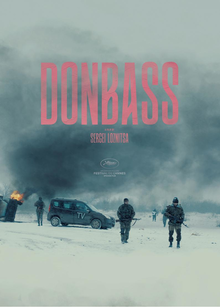
We loved director Sergei Loznitsa’s previous work A Gentle Creature despite not understanding many parts of it so I was looking forward to this newer film. However this turned out to be less of a coherent film than a series of unrelated vignettes, many shot in a way as to suggest a documentary style. This one may be even more difficult for foreigners unfamiliar to the region to understand but the expressive power and sense of outrage present here transcend language and culture.
This film consists entirely of scenes that are all set in a proto-state set up in occupied Eastern Ukraine, each of which recount individual, unrelated stories. The first one for example opens with a group of actors being made up in a trailer for a shoot. Yet what they are filming is revealed to be a news segment in which they are pretending to be bystanders and witnesses to a violent attack in their residential neighborhood, presumably perpetrated by Ukrainian forces. Many of the scenes share a similar focus on manipulation of the media and the propaganda war to establish what truth is. Most of the stories are quite concrete such as the one where an unseen reporter is taken underground to see the terrible conditions of those forced to live in a bomb shelter but some are harder to understand. There’s an extended wedding scene for example that feels similar in style to A Gentle Creature and seems like an allegory to the grotesque ugliness of the new state the rebels are trying to set up.
In my earlier post, I wrote of the director Loznitsa as if he were Russian and that of course was wrong. He was born in Belarus when it was part of the Soviet Union but is today Ukrainian. I guess that is why he can be so unflinching in his condemnation of the Russian government and his utter contempt comes across so strongly. The film makes its point rather crudely at times such as when a group of bystanders beat up a Ukrainian soldier, all the while accusing him of being a fascist but it does make an impact. As my wife notes, the film’s refusal to focus on any particular character or follow a unified narrative arc means that it may be difficult to be emotionally engaged with it. I suspect that much is also lost in translation as we are unable to distinguish between Russian and Ukrainian. It takes some background knowledge for example to realize that Novorossiya, the country that is praised in a bombastic national anthem, is a reference to a historical term used by the Russian Empire. That’s why this film is doubly difficult for us to get into.
I do find its extreme cynicism about state manipulation of public perception to be a puissant depiction of the times. Behind this of course is the admission that even to the men with guns, image and the veneer of civilization matter. That’s why while a thug stealing a car would be unremarkable, there is something profoundly chilling about a man going to reclaim his car, thinking that he has the law and reasonableness on his side, and coming away thoroughly chastened. This isn’t a good film as it is not very well crafted and comes across as a pure cry of rage. Still it has its value and in the absence of anything better, it’s the best film we have about what is still in reality the Russian invasion of Ukraine.